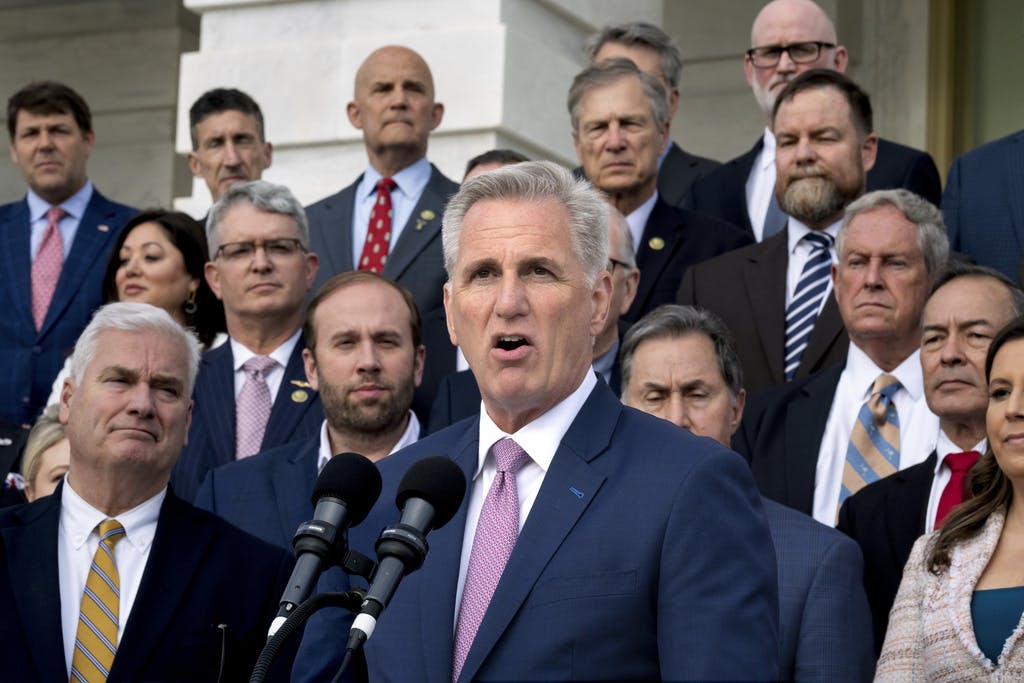Americans Prepared To Blame Both Parties as Showdown Between McCarthy, Biden Over Debt Ceiling Enters Dangerous Waters
Speaker McCarthy is about to embark on the same sort of negotiations that ended Speaker Boehner’s career.

As Speaker McCarthy enters a phase of negotiation over the debt ceiling that cost his mentor, Speaker Boehner, his job, a new poll suggests that Americans don’t approve of his negotiating tactics but are prepared to blame both parties in the event of a default.
A poll of 1,006 adults from ABC News and the Washington Post released Sunday found that Americans overwhelmingly think that “issues of debt payment and federal spending should be handled separately.”
According to the poll, 58 percent of respondents reported feeling that debt and spending negotiations should be handled separately, while 26 percent said that Congress should raise the debt ceiling “only if Biden agrees to cut spending.”
Although President Biden has insisted that budget negotiations and debt ceiling negotiations happen separately and House Republicans have insisted they happen together, the survey found that Americans are prepared to blame both parties in the event of a default.
The survey found that 39 percent of respondents would blame Republicans in Congress and 36 percent would blame Mr. Biden, a finding within the poll’s 3.5-point margin of error.
These numbers come as Mr. McCarthy is about to embark on debt ceiling negotiations between House Republicans and Mr. Biden, a phase of negotiations that ended the career of his mentor.
As it stands, Republicans in the House have passed a measure to raise the debt ceiling, but the spending cuts demanded in that measure have been rejected by Democrats and the White House.
As Mr. McCarthy begins negotiations at a meeting tomorrow, he will need to find a deal that appeases far-right members of his own conference, that could pass the Democrat-controlled Senate, and that Mr. Biden will sign.
In the same stage of negotiations concerning funding the government in 2015, Speaker Boehner announced his decision to resign from the speakership, becoming the first to do so in 30 years.
Mr. Boehner’s decision was motivated, in part, by an inability to resolve GOP infighting between mainstream Republicans and members of the then relatively new Freedom Caucus.
Shortly after his resignation, Congress passed a stop-gap measure to fund the government through December 11, 2015, and elected Speaker Ryan, even though Mr. Boehner favored Mr. McCarthy as his successor.
Over the following month, Mr. Ryan pushed through a deal that both suspended the debt limit through the rest of President Obama’s term and set spending caps for the subsequent two years.
On Tuesday, Mr. McCarthy will have the first meeting with Mr. Biden and leaders in the Senate. Although Mr. McCarthy has the support of Senate Republicans, it’s not clear that he has the support of all GOP members of the House as he enters negotiations.
Members of the Freedom Caucus have expressed their doubts, with the caucus’s chairman, Representative Scott Perry, telling the Hill that members aren’t willing to compromise.
“The administration and, quite honestly, the Democrats in the Senate have fiddled. They’ve created the tight timeline,” Mr. Perry said. “It’s not like we’re going to negotiate with ourselves or backtrack from our current position, which we fought hard to come to.”
Putting more pressure on Mr. McCarthy is the renewed “motion to vacate” in the House. During the speaker election, Mr. McCarthy reinstated this motion, which allows any single House member to force a vote on the removal of the speaker.
With the hardline position conservatives in the House have taken on debt ceiling negotiations, Democrats have prepared a workaround in the form of a discharge petition.
A discharge petition is a way for members of the House to bring a bill to a vote without the input of the speaker. It would need a majority of members to vote for it, meaning five Republicans would need to join every Democrat.
One member of the House, Representative Jeff Jackson, has speculated that the petition may be the only way for Mr. McCarthy to get through the debt ceiling debacle without facing a Freedom Caucus revolt like the one Mr. Boehner faced.
“My sense is that, in private, the speaker would be incredibly relieved that they went around him,” Mr. Jackson said. “It gets him off the hook. We don’t default and he gets to remain as speaker because he doesn’t have to do any compromise that would really upset his right flank.”

